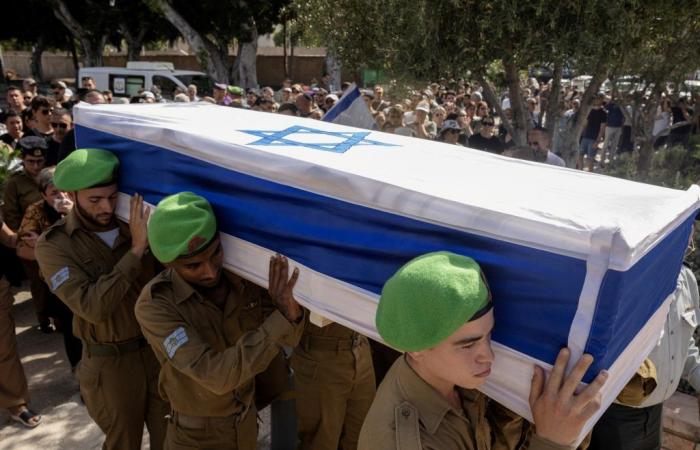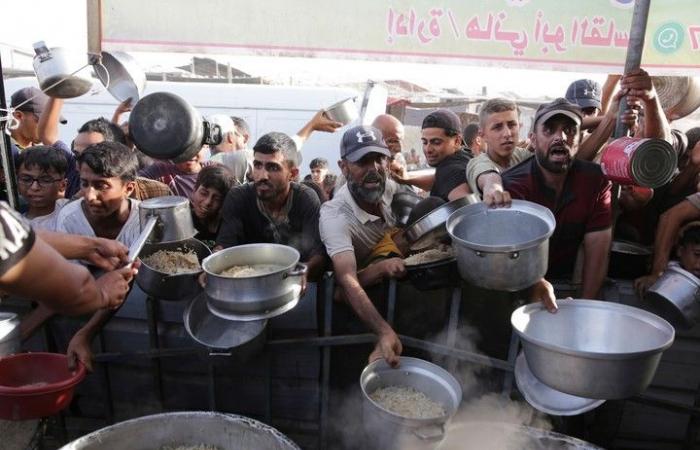The Israeli army announced that will stop fighting during certain hours of the day in an area of southern Gaza to alleviate the delay in the delivery of humanitarian aid to desperate Palestinians suffering from the humanitarian crisis unleashed by the war.
The announced “tactical pause”, which affects an area of about 12 kilometers of road in the Rafah area, is far from the ceasefire demanded by the international community, including Israel’s main ally, the United States, for the entire territory. If sustained, the limited cessation of confrontations could help address some of the overwhelming needs of the Palestinians, which have increased further in recent weeks with the start of the Israeli campaign in Rafah.
The pause will begin at 8 a.m. and will last until 7 p.m., the army said. pointing out that it will be repeated every day until further notice.
Measure seeks to allow the entry of trucks through the nearby Kerem Shalom border crossing, which is controlled by Israel and is the main port of entry for aid, and to safely reach the Salah a-Din highway, the main road that crosses the besieged enclave from north to south, the army explained. The crossing has been bottlenecked since Israeli ground troops advanced to Rafah, the territory’s southernmost city, in early May.
COGAT, the Israeli military body that oversees aid distribution in the Strip, said the move would increase the arrival of aid to other parts of the territory, such as Khan Younis, Muwasi or central Gaza. The north of the enclave, which was the first objective of the war, receives help through a border crossing in the area.
The military said the pause — which coincides with the start of the Eid Al-Adha, or festival of sacrifice, in Gaza and the Muslim world — It was coordinated with the United Nations and international aid agencies.
The fighting continues
After criticism of the initiative by ultranationalists in the government of Prime Minister Benjamin Netanyahu, opposed to any pause in the war, the army explained that the fighting continued in the rest of the Strip and that The general conditions for the entry of aid were not modified.
A spokesman for UN humanitarian management, Jens Laerke, told The Associated Press that Israel’s announcement is welcome but that “no humanitarian aid has come through Kerem Shalom today,” without giving details. He added that the UN hopes that Israel will take concrete measures such as streamlining the operation of checkpoints and allowing the regular entry of fuel.
Scott Anderson, director of the UN agency for Palestinians in Gaza, told CNN that he hopes the pause “allows the entry of the help that the population needs so much.”
The move comes at a time when Israel and Hamas They value the latest ceasefire proposal, presented by Joe Biden’s government in its most important diplomatic effort to end the war and free the hostages held in the enclave. Although Biden said it was an Israeli proposal, Israel has not fully accepted it and Hamas has demanded changes that seem unacceptable to its rival.
Meanwhile, the war continues its course. Israel announced this Sunday the names of 11 soldiers killed in recent attacks in Gaza, including one who died from injuries suffered in an assault last week. This brings the total casualties of Israeli forces in Gaza to 308 troops.
Hamas killed 1,200 people, mostly civilians, in its October 7 raid on southern Israel, and captured about 250 others as hostages, according to Israeli authorities. The Gaza Ministry of Health, for its part, maintains that more than 37,000 Palestinians They have lost their lives in the war.
The eight months of Israeli military offensive against Hamas, sparked by the insurgent incursion, have plunged Gaza into a humanitarian crisis and the UN reported widespread hunger with hundreds of thousands of people on the verge of famine. The international community has urged Israel to do more to alleviate the situation and says ongoing fighting, including in Rafah, has complicated the delivery of aid.
Between May 6 and June 6, the UN received an average of 68 trucks of aid per day, according to data from its humanitarian office, OCHA. That’s fewer than the 168 that came in each day in April and far below the 500 a day that aid groups say are needed.
The flow of aid into southern Gaza slowed just as humanitarian needs increased. More than a million Palestinians, many of whom had already abandoned other areas of the territory due to the fighting, fled Rafah after the invasion, crowding into other parts of the south and center of the Strip. Most now languish in squalid tent camps, where trenches are used as latrines and sewage runs openly through the streets.
COGAT said there will be no restrictions on the entry of trucks and noted that more than 8,600, both aid and commercial, entered Gaza through all crossings between May 2 and June 13, an average of 201 per day. But much of that aid accumulates in the steps and has not reached its final destination.
A COGAT spokesman, Shimon Freedman, indicated that the UN was to blame for the accumulation of merchandise on the Gazan side of Kerem Shalom and indicated that the agencies tThey have “fundamental logistical problems that they have not solved”, especially the lack of trucks.
The United Nations denies those accusations and maintains that the fighting between Israel and Hamas makes it too dangerous for the trucks it has in the enclave to go to Kerem Shalom.
The pace of deliveries has slowed because, according to the UN, the military must authorize drivers to go to the site, a system that Israel says is designed for the truckers’ own safety. Due to the lack of security, trucks carrying humanitarian aid have sometimes been looted while traveling through Gaza.
The new measure seeks to reduce the need to coordinate deliveries by providing a window of 11 consecutive hours each day for trucks to enter and exit the intersection.
It was not immediately clear whether the military would protect the trucks as they advanced along the highway.







